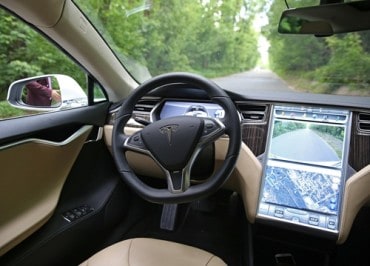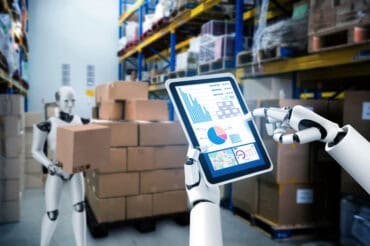
2024 trends: As AI and automation continue evolving, businesses must adapt their strategies, processes, and talent to most effectively harness these tools while retaining a human touch.
Artificial intelligence (AI) and automation are transforming multiple industries and business functions — from consulting and HR to IT purchasing decisions. Some worry that this technology may become self-aware and threaten humanity, but we’re nowhere near a future suggested by the cautionary tale of Skynet.
AI and automation do offer tremendous potential for efficiency gains and data-driven insights, but these technologies cannot wholly replace human skills and contextual decision-making. Companies combining AI capabilities with human expertise in a hybrid model stand to realize the greatest benefits.
As AI and automation continue evolving, businesses must adapt their strategies, processes, and talent to most effectively harness these tools while retaining a human — and necessary — touch.
AI disrupts the consulting industry
Will AI take over the consulting roles? No — but it will augment them. Half of mid-sized businesses already use AI to choose software, with 70% saying this tool helps save time and money compared to working with traditional consultants. The reality is that consultants, while insightful, can miss the unique intricacies of an organization’s specific needs, leading to poor user adoption and misaligned stakeholder requirements.
But AI cannot generate contextual advice for dynamic situations or make nuanced judgments and recommendations because knowledge extends beyond the data AI is trained on. AI can, however, tap into company data, past projects, and applicable skills to match team members and consultants with the right experience to address challenges.
Unless the industry adapts to working alongside modern tools, AI could kill traditional consulting. The industry must reinvent itself to remain competitive and harness the power of combining both human expertise with AI-driven decision-making tools, which increase consultants’ effectiveness and efficiency and lead to better client outcomes.
HR digital transformation trends
Factors like changing workforce dynamics and technological advancements drive the constant evolution in the HR field. HR professionals have embraced AI and automation, recognizing their potential to revolutionize various operational aspects, from recruitment and onboarding to employee engagement and performance management.
HR will continue leaning into AI-powered tools to automate repetitive manual tasks, enhance data analytics capabilities, and streamline administrative processes. Adopting and implementing AI will free HR teams to focus on strategic initiatives and gain insights via predictive analytics into employee development, engagement, performance, and retention.
See also: In an Age of Hyper Automation, Most Tech Problems are Still Fixed Manually
The future of IT decision-making
Surveys show that IT spending is shifting, with over half of enterprise and mid-market organizations planning to increase IT budgets in 2024. That said, companies are moving into more complex buying processes, with an average of 22 roles on a buying committee involved in purchasing software. Those roles might include C-suite execs, department leads, end users, internal influencers, legal team users, and IT departments.
If you tried to map the journey, you wouldn’t see a linear path or an easy flowchart, either. Instead, the journey would resemble a maze of back-and-forth between stakeholders at various stages, from problem identification and solution exploration to requirements building and supplier selection, before ever reaching the purchase decision stage.
And with more decision-makers comes more potential headaches — for companies and vendors — reaching a consensus may become even more difficult. We’re seeing the final decision come down to the C-suite executives as SaaS solutions have evolved to use low- or no-code technologies that don’t require specific, in-depth expertise for onboarding and set-up.
The time to purchase is still fairly lengthy, with about 33% of buyers needing 4-6 months to finalize purchases of $20,000 or more. Most buyers (80%) planning a large software purchase ($20,000+) pull the trigger in fewer than six months. Negotiation times last longer now than legal review, too, with the average negotiation time of 22 days and legal review of 11 days.
Buyers are becoming cautious about basing purchases solely on information found on a particular vendor’s website. They’re seeking other external, credible sources — like professional networks, market reports, recommendations, and user-generated content via online communities, review sites, and social media platforms — to get data and gather insights for informed decision-making.
Once they’ve shortlisted their options, buyers are looking beyond features and pricing. They’re interested in user-friendliness, ease of implementation, customer support quality, ROI, and level of data security. B2B SaaS buyer behavior will continue to evolve and, thus, influence how software sellers approach how they present their products in this very competitive industry.
The role of AI and automation
AI and automation continue to transform consulting, HR, IT purchasing, and more. While some may worry these technologies echo Skynet’s threat, we remain far from an AI-dominated dystopia. The path ahead lies not in AI replacing humanity but in complementing it.
Businesses realizing AI’s full potential will be those that implement it thoughtfully, combining automated efficiency and data-driven insights with equally vital human skills, contextual decision-making, and ethical oversight. Though the technology will continue its rapid evolution, the most successful companies will adapt by leveraging its strengths and championing the necessity of the human touch.
With responsible implementation, AI and automation will augment our capabilities beyond what we can achieve independently. Complementing human ingenuity with technological innovation will build a brighter collective future and enhance our world — not endanger it.





























